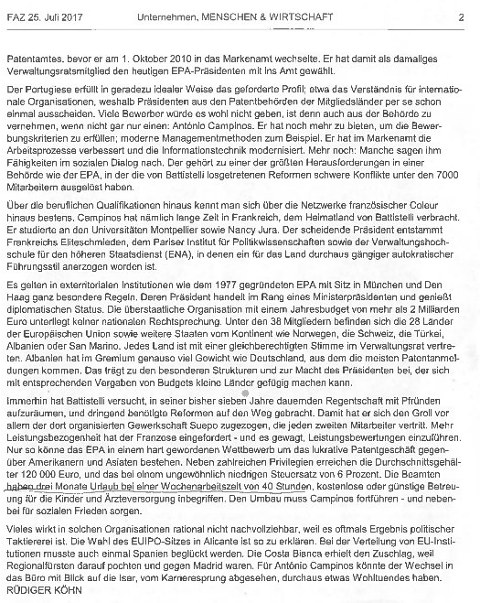

SOMETHING INTERESTING happened in the German media this past week; the above article (EPO article from FAZ) aside, there is another one (titled "Den Chef nennen sie Putin") pointed out by SUEPO this morning. A translation would be nice and maybe SUEPO is already working on it. "Finally," one insider wrote, "the German Press starts to write about the EPO" (more in [1, 2] to that effect). There seem to also be attempts to pressure the German media to cover the Lufthansa scandals ("EPO, Lufthansa, and the German Government - Part II" will be out soon) and days ago German media mentioned German court/s forbidding the use of keyloggers (like Battistelli and his British spies -- with actual connections to the Stasi through Desa -- illegally did on German soil). This was covered also in the English media around the same time (it's in our daily links). Is the tide turning? It's too early to tell, but one can hope. Will lawlessness end? Eager to see the UPC, Maas never seemed to care about lawlessness at the EPO; he intentionally looked the other way, even when he was approached directly. The UPC now faces a serious constitutional complaint in Germany and earlier today we found the following new comment in IP Kat:
For the present:
As there is no judicial review by a national court of a member state of the EU in case of revocation of a patent or refusal of an application, we are bang in the constitutional problems which are to be discussed before the German Constitutional court.
The liability of the member states of the EU might also be at stake with the present amendment of R 27 and 28 EPC, see CIPAs observations.
Another interesting point:
Are the implementing regulations as decided by the Administrative Council always applicable to the Boards of Appeal?
The answer is no, cf. G 6/95, OJ 1996, 649. At the time of this decision, the Praesidium of the BA decided upon the RPBA, which were subsequently enacted by the AC.
With the new structure of the Boards of Appeal, the Praesidium of the Boards having been given the opportunity to comment, the RPBA are decided by the BA Committee, cf R 12c(2)EPC. It means that the Praesidium has just to be heard, but his opinion can be disregarded. I therefore wonder whether a decision like G 6/95 would still be possible.
But the perception of independence of the Boards has been increased....
For the future And we do not yet have the UPC up and running, and are over the transitional period for opt out.
Once a patent has been granted, the UPC can only take decisions as to infringement and validity, under the control (directly or indirectly) of the CJEU, valid for its member states. It can, at a pinch, decide for member states of the EU which are not member states of the UPC, but it cannot decide for member states of the EPC, which are are neither member states of the EU nor of the the UPC.
Where is the simplification heralded by all the proponents of the UPC?
Why has the UPC not be brought in front of the CJEU?
We really live in interesting times!